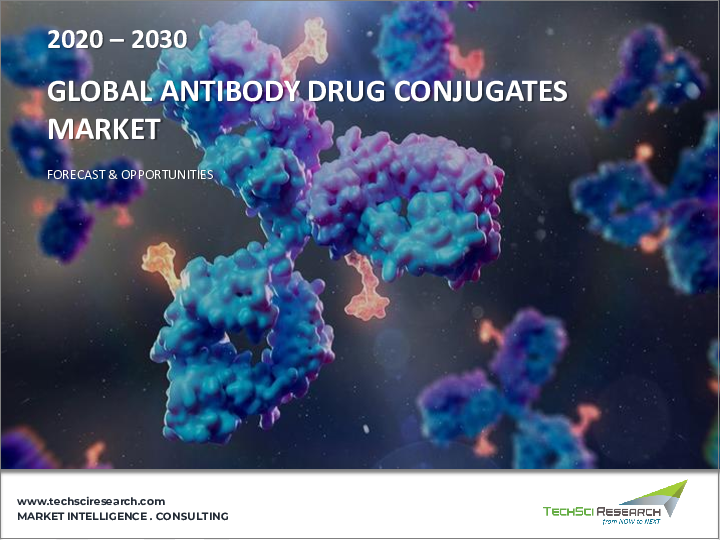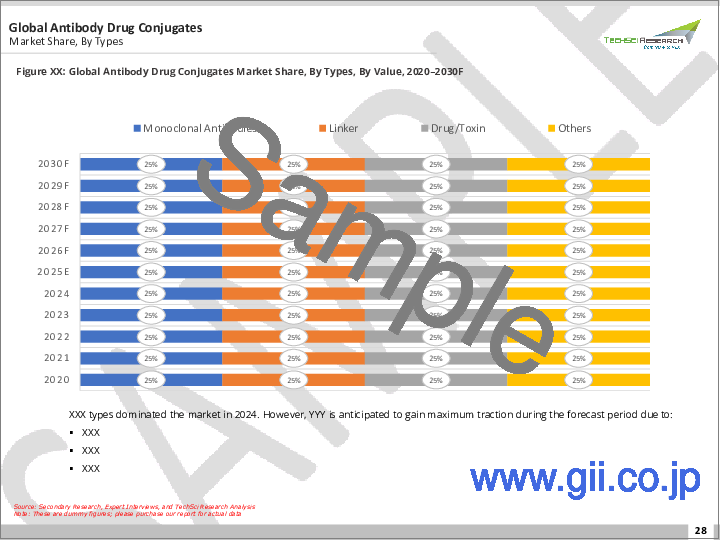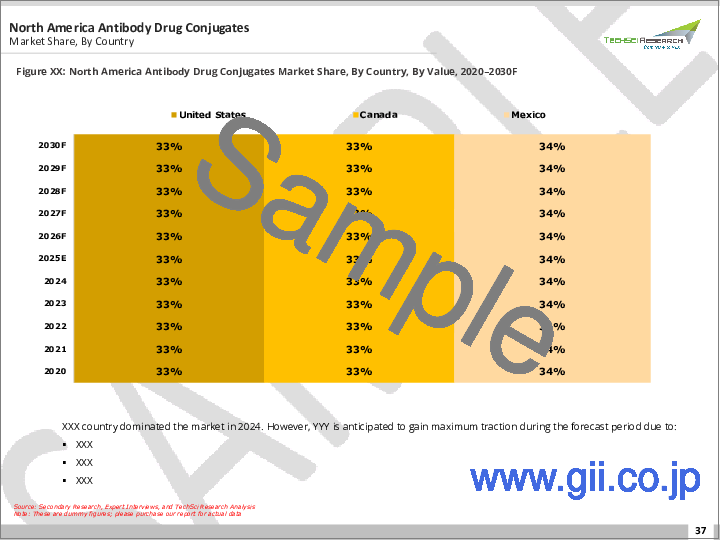|
|
市場調査レポート
商品コード
1692291
抗体薬物複合体市場- 世界の産業規模、動向、機会、予測、タイプ別、用途別、地域別、競合別、2020~2030年Antibody Drug Conjugates Market - Global Industry Size, Share, Trends, Opportunity, and Forecast, Segmented By Types, By Application, By Region & Competition, 2020-2030F |
||||||
カスタマイズ可能
|
|||||||
| 抗体薬物複合体市場- 世界の産業規模、動向、機会、予測、タイプ別、用途別、地域別、競合別、2020~2030年 |
|
出版日: 2025年03月24日
発行: TechSci Research
ページ情報: 英文 187 Pages
納期: 2~3営業日
|
全表示
- 概要
- 目次
抗体薬物複合体の世界市場規模は2024年に77億5,000万米ドルとなり、予測期間では2030年までCAGR 6.25%で目覚ましい成長が予測されています。
抗体薬物複合体(ADC)市場は、製薬・バイオテクノロジー業界においてダイナミックかつ急速に発展している分野です。ADCは、モノクローナル抗体(mAb)の特異性と細胞毒性薬剤の効能を併せ持つ画期的ながん標的治療薬です。この相乗効果により、強力な抗がん剤をがん細胞に直接正確に送達する一方、健康な組織を温存することが可能となり、従来の化学療法に伴う副作用を最小限に抑えることができます。ADC市場は、いくつかの重要な要因によって大きく成長しています。第一に、世界的に、また様々ながん種でがんの有病率が増加していることから、革新的で効果的な治療法の必要性が高まっています。ADCは有望なソリューションとして登場し、治療の選択肢が限られている患者に治療成績の改善を提供しています。
| 市場概要 | |
|---|---|
| 予測期間 | 2026~2030年 |
| 市場規模:2024年 | 77億5,000万米ドル |
| 市場規模:2030年 | 110億6,000万米ドル |
| CAGR:2025~2030年 | 6.25% |
| 急成長セグメント | モノクローナル抗体 |
| 最大市場 | 北米 |
主な市場促進要因
がん罹患率の増加
主な市場課題
限られた種類の腫瘍
主な市場動向
様々ながんの適応症に対するADC候補のパイプラインの増加
目次
第1章 概要
第2章 調査手法
第3章 エグゼクティブサマリー
第4章 顧客の声
第5章 世界の抗体薬物複合体市場展望
- 市場規模・予測
- 金額別
- 市場シェア・予測
- タイプ別(モノクローナル抗体、リンカー、薬物/毒素、その他)
- 用途別(血液がん、乳がん、卵巣がん、肺がん、脳腫瘍、その他)
- 地域別
- 企業別(2024年)
- 市場マップ
第6章 北米の抗体薬物複合体市場展望
- 市場規模・予測
- 市場シェア・予測
- 北米:国別分析
- 米国
- カナダ
- メキシコ
第7章 欧州の抗体薬物複合体市場展望
- 市場規模・予測
- 市場シェア・予測
- 欧州:国別分析
- ドイツ
- 英国
- イタリア
- フランス
- スペイン
第8章 アジア太平洋地域の抗体薬物複合体市場展望
- 市場規模・予測
- 市場シェア・予測
- アジア太平洋地域:国別分析
- 中国
- インド
- 日本
- 韓国
- オーストラリア
第9章 南米の抗体薬物複合体市場展望
- 市場規模・予測
- 市場シェア・予測
- 南米:国別分析
- ブラジル
- アルゼンチン
- コロンビア
第10章 中東・アフリカの抗体薬物複合体市場展望
- 市場規模・予測
- 市場シェア・予測
- 中東・アフリカ:国別分析
- 南アフリカ
- サウジアラビア
- アラブ首長国連邦
第11章 市場力学
- 促進要因
- 課題
第12章 市場動向と発展
- 最近の動向
- 製品上市
- 合併と買収
第13章 世界の抗体薬物複合体市場:SWOT分析
第14章 競合情勢
- Novartis AG
- F. Hoffmann-La Roche Ltd
- Takeda Pharmaceutical Company Limited
- Pfizer Inc.
- Seattle Genetics Inc
- Genentech Inc
- Immunogen Inc
- Immunomedics Inc
- Progenics Pharmaceuticals Inc
- Bayer HealthCare Pharmaceuticals Inc
第15章 戦略的提言
第16章 調査会社について・免責事項
Global Antibody Drug Conjugates Market was valued at USD 7.75 billion in 2024 and is anticipated to project impressive growth in the forecast period with a CAGR of 6.25% through 2030. The Antibody Drug Conjugates (ADCs) Market is a dynamic and rapidly evolving segment within the pharmaceutical and biotechnology industries. ADCs represent a groundbreaking class of targeted cancer therapies that combine the specificity of monoclonal antibodies (mAbs) with the potency of cytotoxic drugs. This synergy enables precise delivery of potent anticancer agents directly to cancer cells while sparing healthy tissue, thereby minimizing side effects associated with traditional chemotherapy. The market for ADCs has witnessed substantial growth driven by several key factors. Firstly, the increasing prevalence of cancer, both globally and across various cancer types, underscores the critical need for innovative and effective treatments. ADCs have emerged as a promising solution, offering improved therapeutic outcomes for patients with limited treatment options.
| Market Overview | |
|---|---|
| Forecast Period | 2026-2030 |
| Market Size 2024 | USD 7.75 Billion |
| Market Size 2030 | USD 11.06 Billion |
| CAGR 2025-2030 | 6.25% |
| Fastest Growing Segment | Monoclonal Antibodies |
| Largest Market | North America |
Key Market Drivers
Growing prevalence of cancer
The growing prevalence of cancer serves as a compelling driver for the Global Antibody Drug Conjugates (ADCs) Market. Cancer has reached alarming proportions worldwide, with millions of new cases diagnosed annually. ADCs, a class of targeted cancer therapies, offer a ray of hope in the battle against this devastating disease. The rise in cancer cases underscores the unmet medical need for more effective and less toxic treatments. ADCs precisely deliver potent anticancer drugs to tumor cells, minimizing damage to healthy tissue, and hence are increasingly sought after. For instance, according to WHO, in 2022, an estimated 20 million new cancer cases and 9.7 million cancer-related deaths were reported globally. By 2050, the cancer burden is expected to rise by 77%, placing greater pressure on health systems and communities. In the WHO Eastern Mediterranean Region, over 788,000 cancer cases were diagnosed in 2022. This number is projected to double to 1.57 million by 2045 due to population growth and widespread risk factors, including tobacco use, obesity, physical inactivity, unhealthy diets, and air pollution. Addressing these risks is crucial to mitigating the rising cancer burden in the region.
Key Market Challenges
Limited Tumor Types
Limited tumor types targeted by Antibody Drug Conjugates (ADCs) pose a significant challenge in the global market. ADCs are highly specific, and their effectiveness depends on the presence of specific antigens on cancer cells. This restricts their applicability to a select range of tumor types, leaving many cancers without effective ADC treatment options. Developing ADCs for a broader spectrum of tumors requires identifying suitable target antigens and investing in extensive research and development. Additionally, regulatory approval for new ADCs can be time-consuming and costly. Overcoming the limitation of tumor types is crucial to expand the market's reach and impact in the oncology field.
Key Market Trends
Growing pipeline of ADC candidates for various cancer indications.
The growing pipeline of Antibody Drug Conjugate (ADC) candidates for various cancer indications is a noteworthy trend in the global ADC market. This trend reflects the increasing interest and investment in ADC research and development, driven by several factors: The ADC field has witnessed a surge in research and investment, leading to the development of a diverse range of ADC candidates. These candidates target various cancer indications, including solid tumors and hematological malignancies. This expansion of the therapeutic landscape is a response to the unmet medical needs across different cancer types. ADCs are known for their precision in targeting cancer cells while sparing healthy tissues. Advancements in genomics and biomarker discovery have enabled the identification of specific antigens and genetic profiles associated with different cancer types. This knowledge allows for the design of ADCs tailored to individual cancer subtypes, promoting personalized treatment approaches. The development of ADCs often goes hand in hand with research into combination therapies. Combining ADCs with other targeted therapies, immunotherapies, or standard chemotherapy regimens can enhance treatment efficacy. This trend aligns with the growing interest in combination approaches to address complex cancer biology. As cancer cells can develop resistance to single-agent therapies, researchers are exploring ADCs as a strategy to overcome resistance mechanisms. This has led to the development of ADCs that target specific resistance pathways or employ alternative mechanisms of action.
Key Market Players
- Novartis AG
- F. Hoffmann-La Roche Ltd
- Takeda Pharmaceutical Company Limited
- Pfizer Inc.
- Seattle Genetics Inc
- Genentech Inc
- Immunogen Inc
- Immunomedics Inc
- Progenics Pharmaceuticals Inc
- Bayer HealthCare Pharmaceuticals Inc
Report Scope:
In this report, the Global Antibody Drug Conjugates Market has been segmented into the following categories, in addition to the industry trends which have also been detailed below:
Antibody Drug Conjugates Market, By Type:
- Monoclonal Antibodies
- Linker
- Drug/Toxin
- Others
Antibody Drug Conjugates Market, By Application:
- Blood Cancer
- Breast Cancer
- Ovarian Cancer
- Lung Cancer
- Brain Tumor
- Others
Antibody Drug Conjugates Market, By Region:
- North America
- United States
- Canada
- Mexico
- Europe
- France
- United Kingdom
- Italy
- Germany
- Spain
- Asia-Pacific
- China
- India
- Japan
- Australia
- South Korea
- South America
- Brazil
- Argentina
- Colombia
- Middle East & Africa
- South Africa
- Saudi Arabia
- UAE
Competitive Landscape
Company Profiles: Detailed analysis of the major companies present in the Antibody Drug Conjugates Market.
Available Customizations:
Global Antibody Drug Conjugates market report with the given market data, TechSci Research offers customizations according to a company's specific needs. The following customization options are available for the report:
Company Information
- Detailed analysis and profiling of additional market players (up to five).
Table of Contents
1. Product Overview
- 1.1. Market Definition
- 1.2. Scope of the Market
- 1.2.1. Markets Covered
- 1.2.2. Years Considered for Study
- 1.2.3. Key Market Segmentations
2. Research Methodology
- 2.1. Objective of the Study
- 2.2. Baseline Methodology
- 2.3. Key Industry Partners
- 2.4. Major Association and Secondary Sources
- 2.5. Forecasting Methodology
- 2.6. Data Triangulation & Validation
- 2.7. Assumptions and Limitations
3. Executive Summary
- 3.1. Overview of the Market
- 3.2. Overview of Key Market Segmentations
- 3.3. Overview of Key Market Players
- 3.4. Overview of Key Regions/Countries
- 3.5. Overview of Market Drivers, Challenges, Trends
4. Voice of Customer
5. Global Antibody Drug Conjugates Market Outlook
- 5.1. Market Size & Forecast
- 5.1.1. By Value
- 5.2. Market Share & Forecast
- 5.2.1. By Types (Monoclonal Antibodies, Linker, Drug/Toxin, Others)
- 5.2.2. By Application (Blood Cancer, Breast Cancer, Ovarian Cancer, Lung Cancer, Brain Tumor, Others)
- 5.2.3. By Region
- 5.2.4. By Company (2024)
- 5.3. Market Map
6. North America Antibody Drug Conjugates Market Outlook
- 6.1. Market Size & Forecast
- 6.1.1. By Value
- 6.2. Market Share & Forecast
- 6.2.1. By Types
- 6.2.2. By Application
- 6.2.3. By Country
- 6.3. North America: Country Analysis
- 6.3.1. United States Antibody Drug Conjugates Market Outlook
- 6.3.1.1. Market Size & Forecast
- 6.3.1.1.1. By Value
- 6.3.1.2. Market Share & Forecast
- 6.3.1.2.1. By Types
- 6.3.1.2.2. By Application
- 6.3.1.1. Market Size & Forecast
- 6.3.2. Canada Antibody Drug Conjugates Market Outlook
- 6.3.2.1. Market Size & Forecast
- 6.3.2.1.1. By Value
- 6.3.2.2. Market Share & Forecast
- 6.3.2.2.1. By Types
- 6.3.2.2.2. By Application
- 6.3.2.1. Market Size & Forecast
- 6.3.3. Mexico Antibody Drug Conjugates Market Outlook
- 6.3.3.1. Market Size & Forecast
- 6.3.3.1.1. By Value
- 6.3.3.2. Market Share & Forecast
- 6.3.3.2.1. By Types
- 6.3.3.2.2. By Application
- 6.3.3.1. Market Size & Forecast
- 6.3.1. United States Antibody Drug Conjugates Market Outlook
7. Europe Antibody Drug Conjugates Market Outlook
- 7.1. Market Size & Forecast
- 7.1.1. By Value
- 7.2. Market Share & Forecast
- 7.2.1. By Types
- 7.2.2. By Application
- 7.2.3. By Country
- 7.3. Europe: Country Analysis
- 7.3.1. Germany Antibody Drug Conjugates Market Outlook
- 7.3.1.1. Market Size & Forecast
- 7.3.1.1.1. By Value
- 7.3.1.2. Market Share & Forecast
- 7.3.1.2.1. By Types
- 7.3.1.2.2. By Application
- 7.3.1.1. Market Size & Forecast
- 7.3.2. United Kingdom Antibody Drug Conjugates Market Outlook
- 7.3.2.1. Market Size & Forecast
- 7.3.2.1.1. By Value
- 7.3.2.2. Market Share & Forecast
- 7.3.2.2.1. By Types
- 7.3.2.2.2. By Application
- 7.3.2.1. Market Size & Forecast
- 7.3.3. Italy Antibody Drug Conjugates Market Outlook
- 7.3.3.1. Market Size & Forecast
- 7.3.3.1.1. By Value
- 7.3.3.2. Market Share & Forecast
- 7.3.3.2.1. By Types
- 7.3.3.2.2. By Application
- 7.3.3.1. Market Size & Forecast
- 7.3.4. France Antibody Drug Conjugates Market Outlook
- 7.3.4.1. Market Size & Forecast
- 7.3.4.1.1. By Value
- 7.3.4.2. Market Share & Forecast
- 7.3.4.2.1. By Types
- 7.3.4.2.2. By Application
- 7.3.4.1. Market Size & Forecast
- 7.3.5. Spain Antibody Drug Conjugates Market Outlook
- 7.3.5.1. Market Size & Forecast
- 7.3.5.1.1. By Value
- 7.3.5.2. Market Share & Forecast
- 7.3.5.2.1. By Types
- 7.3.5.2.2. By Application
- 7.3.5.1. Market Size & Forecast
- 7.3.1. Germany Antibody Drug Conjugates Market Outlook
8. Asia-Pacific Antibody Drug Conjugates Market Outlook
- 8.1. Market Size & Forecast
- 8.1.1. By Value
- 8.2. Market Share & Forecast
- 8.2.1. By Types
- 8.2.2. By Application
- 8.2.3. By Country
- 8.3. Asia-Pacific: Country Analysis
- 8.3.1. China Antibody Drug Conjugates Market Outlook
- 8.3.1.1. Market Size & Forecast
- 8.3.1.1.1. By Value
- 8.3.1.2. Market Share & Forecast
- 8.3.1.2.1. By Types
- 8.3.1.2.2. By Application
- 8.3.1.1. Market Size & Forecast
- 8.3.2. India Antibody Drug Conjugates Market Outlook
- 8.3.2.1. Market Size & Forecast
- 8.3.2.1.1. By Value
- 8.3.2.2. Market Share & Forecast
- 8.3.2.2.1. By Types
- 8.3.2.2.2. By Application
- 8.3.2.1. Market Size & Forecast
- 8.3.3. Japan Antibody Drug Conjugates Market Outlook
- 8.3.3.1. Market Size & Forecast
- 8.3.3.1.1. By Value
- 8.3.3.2. Market Share & Forecast
- 8.3.3.2.1. By Types
- 8.3.3.2.2. By Application
- 8.3.3.1. Market Size & Forecast
- 8.3.4. South Korea Antibody Drug Conjugates Market Outlook
- 8.3.4.1. Market Size & Forecast
- 8.3.4.1.1. By Value
- 8.3.4.2. Market Share & Forecast
- 8.3.4.2.1. By Types
- 8.3.4.2.2. By Application
- 8.3.4.1. Market Size & Forecast
- 8.3.5. Australia Antibody Drug Conjugates Market Outlook
- 8.3.5.1. Market Size & Forecast
- 8.3.5.1.1. By Value
- 8.3.5.2. Market Share & Forecast
- 8.3.5.2.1. By Types
- 8.3.5.2.2. By Application
- 8.3.5.1. Market Size & Forecast
- 8.3.1. China Antibody Drug Conjugates Market Outlook
9. South America Antibody Drug Conjugates Market Outlook
- 9.1. Market Size & Forecast
- 9.1.1. By Value
- 9.2. Market Share & Forecast
- 9.2.1. By Types
- 9.2.2. By Application
- 9.2.3. By Country
- 9.3. South America: Country Analysis
- 9.3.1. Brazil Antibody Drug Conjugates Market Outlook
- 9.3.1.1. Market Size & Forecast
- 9.3.1.1.1. By Value
- 9.3.1.2. Market Share & Forecast
- 9.3.1.2.1. By Types
- 9.3.1.2.2. By Application
- 9.3.1.1. Market Size & Forecast
- 9.3.2. Argentina Antibody Drug Conjugates Market Outlook
- 9.3.2.1. Market Size & Forecast
- 9.3.2.1.1. By Value
- 9.3.2.2. Market Share & Forecast
- 9.3.2.2.1. By Types
- 9.3.2.2.2. By Application
- 9.3.2.1. Market Size & Forecast
- 9.3.3. Colombia Antibody Drug Conjugates Market Outlook
- 9.3.3.1. Market Size & Forecast
- 9.3.3.1.1. By Value
- 9.3.3.2. Market Share & Forecast
- 9.3.3.2.1. By Types
- 9.3.3.2.2. By Application
- 9.3.3.1. Market Size & Forecast
- 9.3.1. Brazil Antibody Drug Conjugates Market Outlook
10. Middle East and Africa Antibody Drug Conjugates Market Outlook
- 10.1. Market Size & Forecast
- 10.1.1. By Value
- 10.2. Market Share & Forecast
- 10.2.1. By Types
- 10.2.2. By Application
- 10.2.3. By Country
- 10.3. MEA: Country Analysis
- 10.3.1. South Africa Antibody Drug Conjugates Market Outlook
- 10.3.1.1. Market Size & Forecast
- 10.3.1.1.1. By Value
- 10.3.1.2. Market Share & Forecast
- 10.3.1.2.1. By Types
- 10.3.1.2.2. By Application
- 10.3.1.1. Market Size & Forecast
- 10.3.2. Saudi Arabia Antibody Drug Conjugates Market Outlook
- 10.3.2.1. Market Size & Forecast
- 10.3.2.1.1. By Value
- 10.3.2.2. Market Share & Forecast
- 10.3.2.2.1. By Types
- 10.3.2.2.2. By Application
- 10.3.2.1. Market Size & Forecast
- 10.3.3. UAE Antibody Drug Conjugates Market Outlook
- 10.3.3.1. Market Size & Forecast
- 10.3.3.1.1. By Value
- 10.3.3.2. Market Share & Forecast
- 10.3.3.2.1. By Types
- 10.3.3.2.2. By Application
- 10.3.3.1. Market Size & Forecast
- 10.3.1. South Africa Antibody Drug Conjugates Market Outlook
11. Market Dynamics
- 11.1. Drivers
- 11.2. Challenges
12. Market Trends & Developments
- 12.1. Recent Developments
- 12.2. Product Launches
- 12.3. Mergers & Acquisition
13. Global Antibody Drug Conjugates Market: SWOT Analysis
14. Competitive Landscape
- 14.1. Novartis AG
- 14.1.1. Business Overview
- 14.1.2. Treatment Offerings
- 14.1.3. Recent Developments
- 14.1.4. Key Personnel
- 14.1.5. SWOT Analysis
- 14.2. F. Hoffmann-La Roche Ltd
- 14.3. Takeda Pharmaceutical Company Limited
- 14.4. Pfizer Inc.
- 14.5. Seattle Genetics Inc
- 14.6. Genentech Inc
- 14.7. Immunogen Inc
- 14.8. Immunomedics Inc
- 14.9. Progenics Pharmaceuticals Inc
- 14.10.Bayer HealthCare Pharmaceuticals Inc





